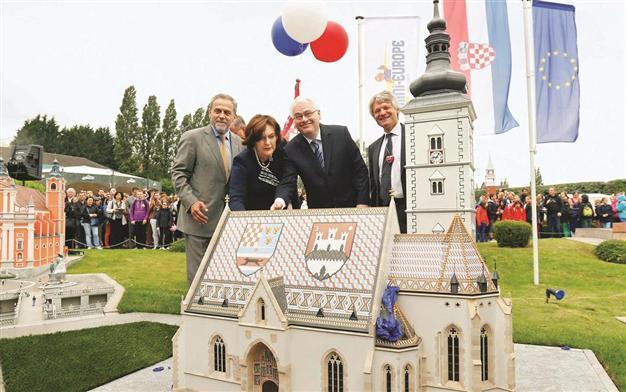Croatia to become EU’s 28th member as Turkey still waits
ZAGREB/SARAJEVO

Croatia President Ivo Josipovic (2R), his wife Tatiana, Zagreb Mayor Milan Bandic (L) and Mini-Europe’s director Thierry Meeus (R), pose next to a miniature reproduction of Saint Marc Church of Zagreb. REUTERS photo
Croatia is set to become the 28th member of the European Union July 1, a milestone capping the Adriatic republic’s recovery from war, while Turkey has still been waiting for full membership to the EU.
Turkey and Croatia both started the negotiation process eight years ago. Turkey started the road toward EU accession when it applied for associate membership of the European Economic Community (EEC) in 1959, in other words 54 years ago. Ankara had the candidate country status in 1999, when Croatia was an 8-year-old country as it declared its independence in 1991 at that time, and the accession negotiations for both countries started in October 2005.
Croatia staged celebrations June 30 to mark its historic entry into the European Union. Heads of state from all six ex-Yugoslav republics were set to attend the ceremony, but leaders of many EU member states – including Britain, France - were not expected to be present. German Chancellor Angela Merkel, the bloc’s most powerful leader, pulled out of the accession ceremony, saying she was too busy. Instead, Merkel urged Croatia to press on with reforms. “There are many more steps to take, especially in the area of legal security and fighting corruption,” she said in a weekly podcast.
Croatia among the poorestPresident Ivo Josipovic told Agence France-Presse recently that the “celebration will be nice and emotional, and of course modest due to the economic situation”.
After all, the country has been either in recession or stagnation since 2009, and unemployment stands at about 20 percent. But the center-left government hopes that the EU entry would attract badly needed foreign investment and boost the economy.
“July 1 [...] opens a completely new perspective, a new world for us,” Social Democratic Prime Minister Zoran Milanovic said on the eve of the ceremony. Tough demands made by the EU in exchange for membership have nevertheless dampened the enthusiasm of Croatians for the bloc. Support for membership is now at just about 50 percent, down from the 66 percent recorded during a referendum last year.
At the same time, the EU itself is struggling with recession in nine of its member states and with the eurozone debt crisis. Figures from the EU’s statistics office show that Croatia, which has a population of 4.2 million, would be among the bloc’s poorest. The country’s per capita gross domestic product (GDP) is 39 percent below the EU average, with only Romania and Bulgaria behind it.
